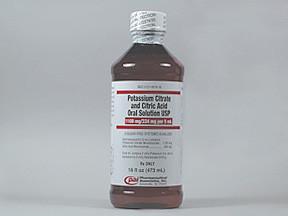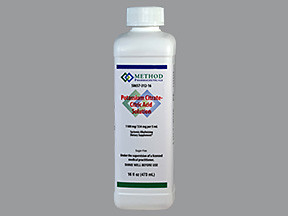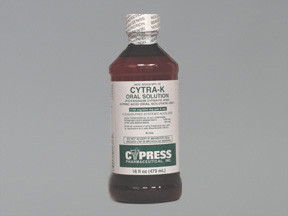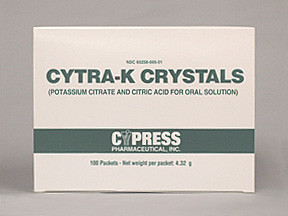POTASSIUM CITRATE/CITRIC ACID - ORAL
PHONETIC PRONUNCIATION: (SIT-rik AS-id /poe-TAS-ee-um SI-trate)
COMMON BRAND NAME(S): Polycitra-K
GENERIC NAME(S): potassium citrate/citric acid
Uses
USES: This medication is used to make the urine less acidic. This effect helps the kidneys get rid of uric acid, thereby helping to prevent gout and kidney stones. This medication can also prevent and treat certain metabolic problems (acidosis) caused by kidney disease. Citric acid and citrate salts (which contain potassium and sodium) belong to a class of drugs known as urinary alkalinizers. If you have a condition that requires you to limit your intake of potassium and sodium, your doctor may direct you to take a product that is lower in potassium and sodium.
How to use POTASSIUM CITRATE/CITRIC ACID - ORAL
HOW TO USE: Take this medication by mouth as directed by your doctor, usually 4 times a day after meals and at bedtime. To help prevent diarrhea, take each dose after a meal. To prevent stomach upset/injury, mix your prescribed dose of medication in cold water or juice as directed. Drink the entire mixture slowly. If you still have stomach upset, mixing your dose in a larger amount of liquid may help unless your doctor directs you otherwise. Ask your doctor or pharmacist for further instructions. The liquid form of this medication must be mixed with at least 4 - 8 ounces (120 - 240 milliliters) of water before taking. Shake the bottle well before each dose and carefully measure the dose using a special measuring device/spoon. Do not use a household spoon because you may not get the correct dose. If you are using the powdered/crystal form of this medication, mix the contents of the packet in at least 3/4 cup (6 ounces or 180 milliliters) of cool water or juice before taking. Refrigerating the mixture before drinking may improve the taste. Drink more water or juice after taking this medication unless otherwise directed by your doctor. Dosage is based on your medical condition and response to treatment. Take this medication exactly as prescribed. Do not increase your dose or take this more often without your doctor's approval. Use this medication regularly to get the most benefit from it. To help you remember, take it at the same times each day. While taking this medication, you may need to test the pH (acidity) of your urine using special paper. The pH will help determine the proper dose. Consult your doctor or pharmacist for more information.
Side Effects
Precautions
Interactions
Overdose
Images
Reviews
Faq for POTASSIUM CITRATE/CITRIC ACID - ORAL
- Potassium Citrate/Citric Acid is used to make urine less acidic and prevent certain types of kidney stones.
- This medication works by increasing the pH of urine, which helps to prevent the formation of certain types of kidney stones.
- Common side effects may include diarrhea, stomach discomfort, nausea, vomiting, and gas. Contact your doctor if you experience severe side effects like muscle weakness, irregular heartbeat, or difficulty breathing.
- Take this medication exactly as prescribed by your doctor. It is usually taken with meals or at bedtime. Follow the instructions on the prescription label carefully.
- It is important to inform your doctor about all the medications you are taking, including prescription, over-the-counter, and herbal remedies, as some drugs can interact with Potassium Citrate/Citric Acid.
- The effects of Potassium Citrate/Citric Acid may take several weeks to become noticeable. It is important to continue taking the medication as directed, even if you do not see immediate results.
- It is generally recommended to avoid drinking alcohol while taking Potassium Citrate/Citric Acid, as alcohol can increase the risk of certain side effects and reduce the effectiveness of the medication.
- If you miss a dose, take it as soon as you remember. However, if it is close to the time for your next dose, skip the missed dose and continue with your regular dosing schedule. Do not double the dose to make up for a missed one.
- It is important to follow the prescribed treatment plan and continue taking Potassium Citrate/Citric Acid until your doctor advises otherwise. Stopping the medication abruptly may increase the risk of kidney stone formation.
Disclaimer
IMPORTANT: HOW TO USE THIS INFORMATION: This is a summary and does NOT have all possible information about this product. This information does not assure that this product is safe, effective, or appropriate for you. This information is not individual medical advice and does not substitute for the advice of your health care professional. Always ask your health care professional for complete information about this product and your specific health needs.





No Reviews Yet